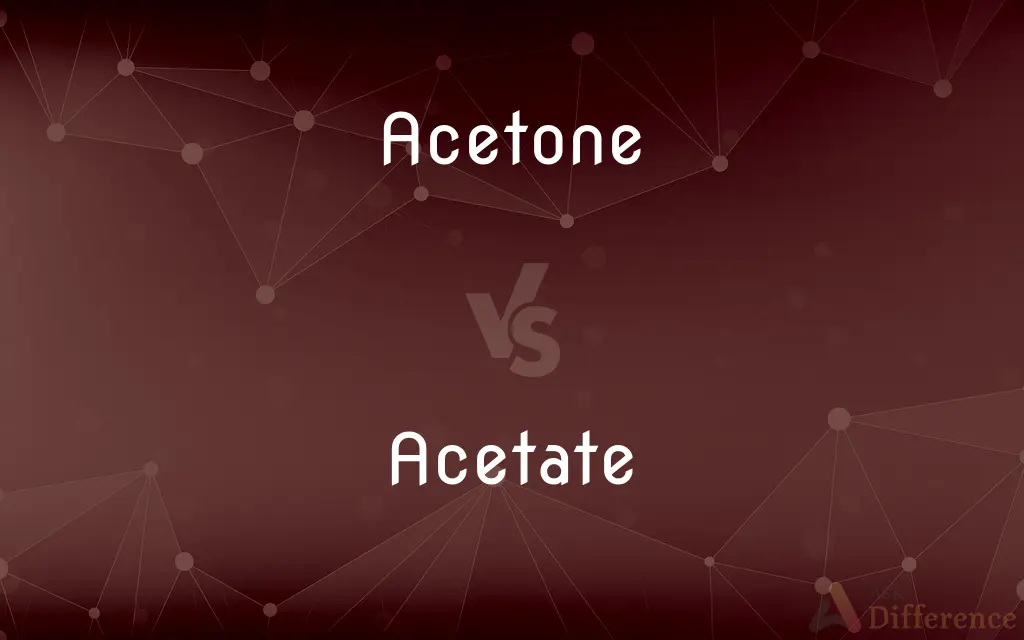Acetone vs. Acetate — What's the Difference?
Edited by Tayyaba Rehman — By Fiza Rafique — Updated on September 21, 2023
Acetone is an organic compound often used as a solvent; it's the simplest ketone. Acetate is an anion derived from acetic acid and is commonly used in making synthetic fibers or plastics. The main difference lies in their chemical structure and uses.

Difference Between Acetone and Acetate
Table of Contents
ADVERTISEMENT
Key Differences
Acetone is a volatile, flammable organic compound often used as a solvent in laboratories and in nail polish removers. Acetate, on the other hand, is an anion or a salt derived from acetic acid and is used in various applications such as making plastics, textiles, and as a food additive.
Acetone has a simpler chemical structure (C3H6O) than acetate (C2H3O2- or CH3COO-) and is a standalone molecule, whereas acetate is often part of larger molecules or salts.
Acetone's volatility makes it highly effective for quick-drying applications, while acetate's stability allows for longer-lasting uses.
Acetone is often a component in industrial solvents, while acetate salts can be found in many everyday items, including food and textiles.
Comparison Chart
Chemical Structure
Simple ketone (C3H6O)
Anion (C2H3O2-)
ADVERTISEMENT
State
Volatile, liquid
Usually part of a salt
Primary Use
Solvent
Plastics, fibers, food additive
Volatility
High
Low
Chemical Complexity
Standalone molecule
Part of larger molecules
Compare with Definitions
Acetone
The simplest form of ketone.
Acetone is the basic building block of ketones.
Acetate
Used in the production of synthetic fibers.
Acetate fibers are common in textiles.
Acetone
Commonly used in labs for chemical reactions.
The lab had a bottle of acetone for experiments.
Acetate
Found in various salts and esters.
Calcium acetate is used as a food stabilizer.
Acetone
An organic compound used as a solvent.
She used acetone to remove her nail polish.
Acetate
An anion or salt derived from acetic acid.
This fabric is made from acetate.
Acetone
A volatile, flammable liquid.
Handle acetone with care; it's highly flammable.
Acetate
A stabilizing agent in many applications.
Acetate is used to stabilize this emulsion.
Acetone
Acetone, or propanone, is an organic compound with the formula (CH3)2CO. It is the simplest and smallest ketone. It is a colourless, highly volatile and flammable liquid with a characteristic pungent odour.
Acetate
An acetate is a salt formed by the combination of acetic acid with a base (e.g. alkaline, earthy, metallic, nonmetallic or radical base).
Acetone
A colorless, volatile, extremely flammable liquid ketone, C3H6O, widely used as an organic solvent. It is one of the ketone bodies that accumulate in the blood and urine when fat is being metabolized.
Acetate
A salt or ester of acetic acid, containing the anion CH₃COO⁻ or the group —OOCCH₃.
Acetone
(organic compound) A colourless, volatile, flammable liquid ketone, (CH3)2CO, used as a solvent.
Acetate
Cellulose acetate, especially as used to make textile fibres or plastic
Acetate silk
Acetone
A volatile liquid consisting of three parts of carbon, six of hydrogen, and one of oxygen; pyroacetic spirit, - obtained by the distillation of certain acetates, or by the destructive distillation of citric acid, starch, sugar, or gum, with quicklime.
Acetate
A salt or ester of acetic acid.
Acetone
The simplest ketone; a highly inflammable liquid widely used as an organic solvent and as material for making plastics
Acetate
Cellulose acetate or any of various products, especially fibers, derived from it.
Acetone
A component in industrial solvents.
This industrial cleaner contains acetone.
Acetate
(organic chemistry) Any salt or ester of acetic acid.
Acetate
Cellulose acetate.
Acetate
A transparent sheet used for overlays.
Acetate
Ellipsis of acetate disc: a disc of aluminium covered in a wax used to make demonstration copies of a phonograph record.
Acetate
A salt formed by the union of acetic acid with a base or positive radical; as, acetate of lead, acetate of potash.
Acetate
A salt or ester of acetic acid
Acetate
A fabric made from cellulose acetate fibers
Acetate
Commonly used as a food additive.
Check the label for sodium acetate.
Common Curiosities
What is acetate?
Acetate is an anion or salt derived from acetic acid.
Where is acetate commonly used?
In plastics, synthetic fibers, and as a food additive.
What is acetone?
Acetone is a volatile organic compound mainly used as a solvent.
Is acetate biodegradable?
Many forms of acetate are biodegradable.
How do they differ chemically?
Acetone is a simple ketone, while acetate is an anion.
Are acetates used in food?
Yes, they're often used as food additives.
Is acetone used in cosmetics?
Yes, commonly in nail polish removers.
Can acetate be used in textiles?
Yes, it's commonly used in synthetic fibers.
Can acetate be harmful?
Generally, it's safe but excessive amounts can be harmful.
Is acetone flammable?
Yes, it's flammable and should be handled carefully.
Can I use acetone to clean?
Yes, but with precautions due to its flammability.
Is acetone volatile?
Yes, acetone is highly volatile.
Is acetate found in everyday products?
Yes, in textiles, food, and various other items.
Does acetone evaporate quickly?
Yes, due to its high volatility.
Is acetone naturally occurring?
Yes, it's found in plants, trees, and even in the human body.
Share Your Discovery

Previous Comparison
Soybean vs. Edamame
Next Comparison
Aphid vs. JassidAuthor Spotlight
Written by
Fiza RafiqueFiza Rafique is a skilled content writer at AskDifference.com, where she meticulously refines and enhances written pieces. Drawing from her vast editorial expertise, Fiza ensures clarity, accuracy, and precision in every article. Passionate about language, she continually seeks to elevate the quality of content for readers worldwide.
Edited by
Tayyaba RehmanTayyaba Rehman is a distinguished writer, currently serving as a primary contributor to askdifference.com. As a researcher in semantics and etymology, Tayyaba's passion for the complexity of languages and their distinctions has found a perfect home on the platform. Tayyaba delves into the intricacies of language, distinguishing between commonly confused words and phrases, thereby providing clarity for readers worldwide.














































